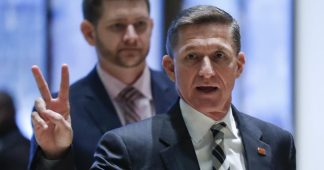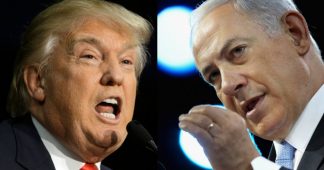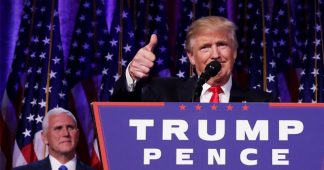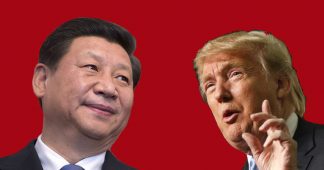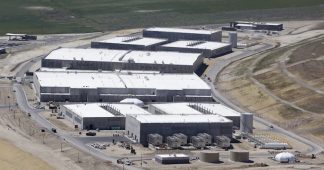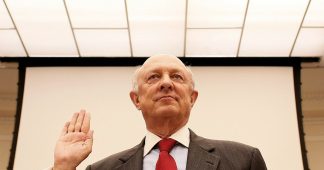President-elect Donald Trump’s authoritarian style and personality, which attracted an overwhelmingly authoritarian following, is manifesting itself in the selection of his national security team. The appointment of Lt. Gen. Michael Flynn as the national security adviser is particularly worrisome because of the general’s lack of experience in strategic policy and his controversial stewardship as the director of the Defense Intelligence Agency. More recently, we have learned that general officers are being given consideration as secretaries of state, defense, and homeland security. Trump is putting at risk the Constitution’s support for civilian control of the military as well as decision-making in the use of force as well as national security policy in general.
What is at stake in this case is the deepening cultural divide between the military and civilian worlds, particularly the increased militarization of national security policy that has taken place over the past two decades. the administrations of Bill Clinton, George W. Bush, and Barack Obama have catered to the military, and have appointed too many general and flag officers to positions that should be in the hands of civilians. President Obama was particularly guilty in this regard, rewarding general officers with ambassadorial positions and naming a retired marine general to the post of national security adviser. The general, James Jones, was a poor fit in terms of both management and substantive support, and was soon forced out of the White House.
With the exception of the first appointment to the post of director of national intelligence, John Negroponte, all of Bush’s and Obama’s intelligence stars have been general and flag officers, and during this period we have witnessed a signficant decline in the production
and usefulness of strategic intelligence. Obama also demonstrated too much deference to the military when he retained Bush’s secretary of defense, Robert Gates, as his own in order not to create concerns about reform of the military within the Pentagon.
On the basis of my experience at the National War College, where I was on the faculty for 18 years, I believe the all-volunteer military has drifted too far away from the norms of American society, in inordinately right-wing politically, and is much more fundamentalist than America as a whole. The “Republicanization” of the officer crop is well established and recognized. As far back as 1997, senior Defense Department officials, including then secretary of defense, William Cohen, a Republican serving in a Democratic administration, warned about a “chasm developing between the military and civilian worlds, where….the military doesn’t understand…why criticism (of the military) is so quick and unrelenting.” Others have noted a “gap” in values between the armed forces and civilian society, which could threaten civil-military cooperation as well as the military’s loyalty to civilian authority.
The imbalance in civilian-military influence is more threatening to the interests of the United States over the long term than developments in Afghanistan. President Richard Nixon’s ending of the draft created a professional military, and the Goldwater-Nichols Act in 1986 created regional commanders-in-chief (CINCs) who expanded the martial reach of the United States in the post-Cold War world. CINCs have become far more influential than U.S. ambassadors and assistant secretaries of state. Presently, the Department of Defense is far more influential in national security decision-making that the Department of State. The Act also created a powerful Chairman of the Joint Chiefs of Staff, and during the Desert Storm war in 1991 the chairman often ignored the secretary of defense and personally briefed the president on war plans. It is noteworthy that the Act passed the Senate without one vote in opposition.
There is no more important risk in political governance than making sure that civilian control of the military is not compromised, and that the military remains subordinate to political authority. In the 1990s, the Pentagon ignored President Clinton’s efforts to get the Joint Chiefs to think about military engagement in Afghanistan; more recently, the Pentagon has dragged its heels in response to President Obama’s efforts to finally disengage from Afghanistan. During a delicate period in decision-making regarding withdrawal from Afghanistan, General Stanley McChrystal—whose Army nickname was “The Pope”—demonstrated his contempt for civilian leadership, which led to his dismissal over the opposition of Secretary of Defense Gates.
Fortunately, the president recognized the McChrystal affair as a challenge to civilian control and leadership. Unfortunately, President-elect Trump believes that military leaders—particularly those who were criticized by President Obama—should hold key positions in the Trump administration. The New York Times’ David Brooks, who is now calling for patience in judging the early actions of Donald Trump, minimized General McChrystal’s remarks as mere “kvetching.” With the possibility of increased defense spending, a return to the worst of the global war on terror, and increased militarization of the defense and intelligence communities, perhaps the time for serious kvetching is here.
